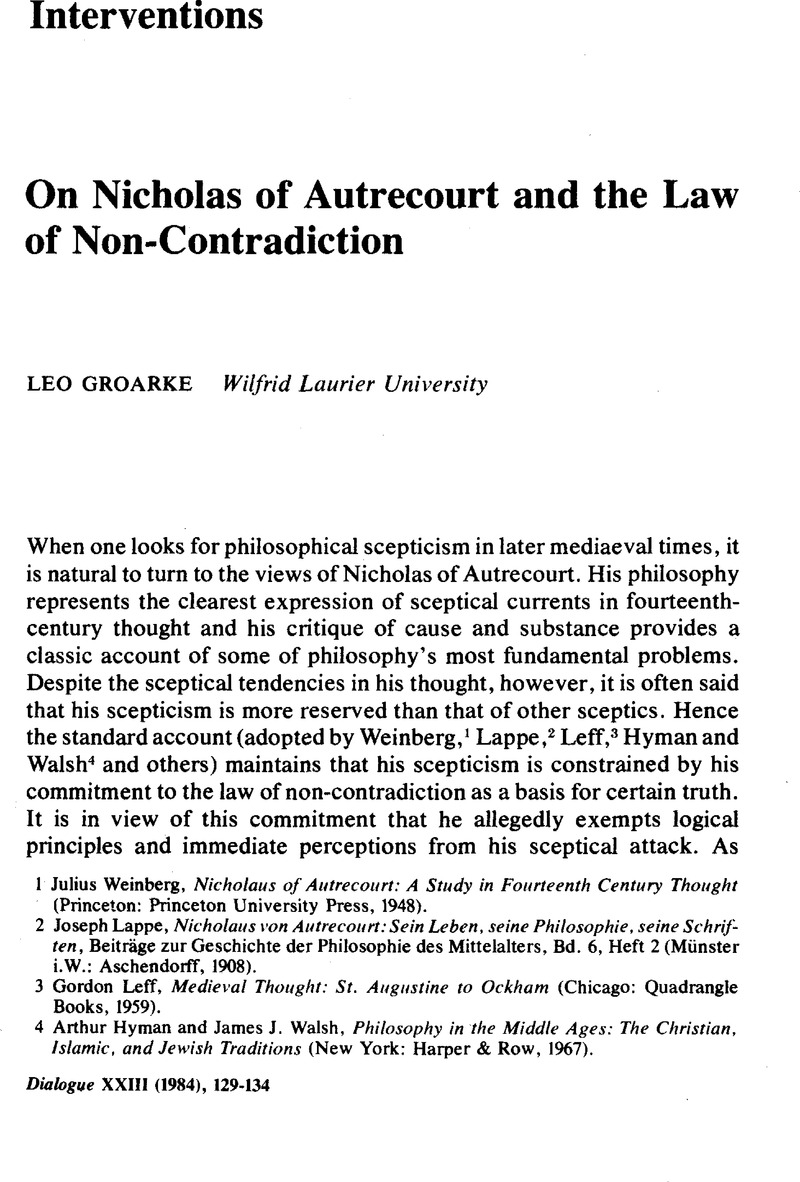No CrossRef data available.
Article contents
On Nicholas of Autrecourt and the Law of Non-Contradiction
Published online by Cambridge University Press: 05 May 2010
Abstract

- Type
- Interventions
- Information
- Dialogue: Canadian Philosophical Review / Revue canadienne de philosophie , Volume 23 , Issue 1 , March 1984 , pp. 129 - 134
- Copyright
- Copyright © Canadian Philosophical Association 1984
References
1 Weinberg, Julius, Nicholaus of Autrecourt: A Study in Fourteenth Century Thought (Princeton: Princeton University Press, 1948).Google Scholar
2 Lappe, Joseph, Nicholaus von Autrecourt: Sein Leben, seine Philosophie, seine Schriften, Beiträge zur Geschichte der Philosophie des Mittelalters, Bd. 6, Heft 2 (Münster i.W.: Aschendorff, 1908).Google Scholar
3 Leff, Gordon, Medieval Thought: St. Augustine to Ockham (Chicago: Quadrangle Books, 1959).Google Scholar
4 Hyman, Arthur and Walsh, James J., Philosophy in the Middle Ages: The Christian, Islamic, and Jewish Traditions (New York: Harper & Row, 1967).Google Scholar
5 Serene, Eileen, “Demonstrative Science”, in Kretzmann, N., Kenny, A. and Pinborg, J., eds., The Cambridge History of Later Medieval Philosophy (New York: Cambridge University Press, 1982), 515.Google Scholar
6 Copleston, Frederick, A History of Philosophy, vol. 3, part 1 (Garden City: Doubleday “Image” Books, 1963), 160.Google Scholar
7 The Latin text of the Exigit has been published by J. R. O'Donnell in “Nicholaus of Autrecourt: Incipit Tractatus Universalis Magistri Nicholai De Ultricuria Ad Videndum An Sermones Peripateticorum Fuerint Demonstrativi”, Medieval Studies 1 (1939), 179-280. I have used the 1971 translation by Kennedy, Leonard A., Arnold, Richard E. and Millward, Arthur E., The Universal Treatise of Nicholas of Autrecourt (Milwaukee, WI: Marquette University Press, 1973).Google Scholar Despite the latter, Nicholas remains a largely neglected and generally underrated philosopher.
8 Exigit, 228, cf. 230, 231, and passim.
9 Ibid., 229.
10 Ibid., 235.
11 Weinberg, Nicholaus of Autrecourt, 180.
12 Exigit, 237.
13 Ibid.
14 Ibid.
15 Ibid.
16 Nicholas does say that one who doubts the law of non-contradiction must admit that it is clear and evident, but this does not contradict his scepticism, for it concerns the question whether the clear and evident is true.
17 This lends further support for Moody's claim that Nicholas is not an Ockhamist philosopher.
18 See Weinberg, , Nicholaus of Autrecourt, 191–192.Google Scholar His reluctance to ascribe to Nicholas a full-fledged scepticism seems to stem primarily from his own rejection of such a view. It seems to me not only that Nicholas adopts a broader scepticism, but also that it cannot be dismissed as easily as Weinberg seems to think.
19 See ibid., 127-128.
20 See ibid., 137-138.
21 For a more detailed discussion of Nicholas' views, and their relationship to those of other sceptics, see Leo Groarke, “Descartes First Meditation: Something Old, Something New, Something Borrowed”, forthcoming in the Journal of the History of Philosophy 22/2 (1984).Google Scholar


